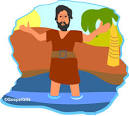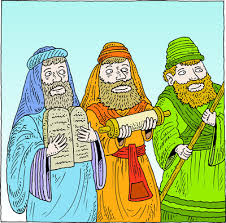John 1:19-20 – And this is the testimony of John, when the Jews sent priests and Levites from Jerusalem to ask him, "Who are you?" He confessed, and did not deny, but confessed, "I am not the Christ."
As John the Baptist preached his message of repentance, his fame spread from the region of Galilee all the way to Jerusalem. From the nature of his preaching, people speculated that he was the long awaited Messiah (Luke 3:15).
 In light of this, it would have been the duty of the Sanhedrin, the great ruling council of the Jews, to examine John and determine whether or not he was the Messiah. It is not unreasonable to assume that they wished/hoped that he was!
In light of this, it would have been the duty of the Sanhedrin, the great ruling council of the Jews, to examine John and determine whether or not he was the Messiah. It is not unreasonable to assume that they wished/hoped that he was!
But John is very careful not to take any of the honor or glory that belonged to Christ. He clearly states, without the slightest hint of ambiguity, that he is NOT the Messiah the Jews are expecting to come.
John 1:21 – And they asked him, "What then? Are you Elijah?" He said, "I am not." "Are you the Prophet?" And he answered, "No."
Why would the Jews ask the Baptist if he was Elijah?
Answer: They were referring back to an Old Testament prophesy.
Malachi 4:5 - Behold, I will send you Elijah the prophet before the coming of the great and dreadful day of the LORD:
The Jews were interpreting this prophesy of Malachi literally. They expected Elijah himself to rise from the dead, reappear upon earth and herald the coming of the Messiah.
So, when the Jews ask John if he is Elijah, they mean it in the literal sense and thus he answers them correctly – 'No, I am not'.
Even though the Jews misunderstood this prophesy, it was still valid. God did exactly as he said he would. He sent his people a prophet (John the Baptist) who possessed and exhibited the same bold, powerful character and message of repentance as Elijah had.
John's ministry pointed people to the true Messiah, preparing them to receive the gospel message from Christ (Luke 1:17, Matthew 3:3). Thus, he was the 'Elijah who was to come'; he was the fulfillment of Malachi's prophesy. Jesus himself confirmed this fact (Matthew 11:14, Mark 9:13).
At this point, John has denied being the Messiah or Elijah raised from the dead. So who is he? Still seeking an answer, the religious leaders next ask if he might be 'the Prophet'. Although it is not certain who the Jews are referring to here, it may have been the prophet Jeremiah (Matthew 16:14) or the unnamed prophet referred to in Deuteronomy 18:15. In either case, John now denies that he holds the prophetic office.
John 1:22 – So they said to him, "Who are you? We need to give an answer to those who sent us. What do you say about yourself?"
So far, John had answered their questions and told them who he was not. He was not the Messiah, nor Elijah raised from the dead, nor any of the Old Testament prophets. At this point the religious leaders are out of ideas, so they plainly ask John, 'Who are you? What account do you give of yourself and your actions?'
Again, this is not an unreasonable question. The Sanhedrin was the ruling religious authority. They did not allow or sanction people to be teachers of the law unless they had been fully trained. Clearly, John had not been. So they needed to investigate his situation. Was he a prophet sent from God? Was he the Messiah himself? Or was he a mere man of no authority teaching religious doctrines?
John 1:23 – He said, "I am the voice of one crying out in the wilderness, 'Make straight the way of the Lord,' as the prophet Isaiah said."
John answers their question by quoting yet another Old Testament scripture/prophesy (His answer is taken from a portion of Isaiah 40:3.) By doing so, John is showing that the scriptures were fulfilled in him; the foundation of his ministry was built upon divine authority. John did not need the approval of the Sanhedrin; he was operating from a much higher calling.
When describing himself, John could have pointed out his great authority, given to him by God. He could have described himself as the one who was specifically chosen for the high honor of heralding the Christ. He could have used a number of high or lofty titles that brought dignity, respect or honor to himself. But he doesn't. Notice that John refers to himself as merely 'the voice'. A voice cannot exist by itself. It is dependent upon the person it belongs to. So John assigns himself a position of humbleness, modesty and dependence upon God. He himself is nothing; he is simply the voice of God.
John is a 'voice'
What is the true purpose of a voice? Isn't it to communicate? Your voice can send a message or sound an alarm. It can also teach or encourage. This shows how John sees himself. He is a vessel that the voice or message of repentance flows through. That voice sounds an alarm that people are dead in their sins. It encourages them to repent and prepare the way for the Messiah who is soon to come.
According to scripture, this voice 'cries in the wilderness'. Why is it described that way?
The word 'cry' signifies earnestness and importunity. John brings a sense of urgency with his message. Sin is not a laughing matter. It is not something to overlook or sweep under a rug. It is something that must be dealt with immediately and completely, without delay; it must take place right now! If the people were to find the true Messiah, they must prepare for his coming NOW.
'Wilderness' is often used to describe a place of barrenness or waste, a neglected or uncultivated region. Spiritually speaking, man is in a wilderness of sin; as long as he is apart from God he experiences spiritual barrenness. His life is disorderly or neglected and he is dead in trespasses and sin. The connotation is that John's voice cried out to people in their sinful, spiritually barren state and called them to a state of life and fruitfulness in Christ through repentance.
It is also worth noting that a wilderness is often entirely uninhabited or very sparsely populated. This was the kind of area where John preached. In such a situation, you could not help but clearly hear his voice crying out.
What about us? In our busy modern lives, can we hear the voice of God calling to us? If not, it might be time to retreat to a place of solitude, apart from the demands of the secular world for a time, so we can more clearly discern what God is saying to us.
John 1:24-25 – (Now they had been sent from the Pharisees.) They asked him, "Then why are you baptizing, if you are neither the Christ, nor Elijah, nor the Prophet?"
Did you notice that it was not the Sadducees or the priests/Levites who questioned the Baptist, but the Pharisees? This makes sense because the Pharisees, more than any other sect of Judaism, were zealous for the Jewish religious rites. They would never allow a rite to be added to Jewish worship except by the authority of the Messiah or a prophet.
In this case, it should be noted that Baptism was not a new rite in the Jewish religion. When a Gentile wished to become a Jewish proselyte he was not accepted until he had been both baptized and circumcised. These baptisms were never performed except by the express permission of the Sanhedrin. In addition, Jews NEVER baptized other Jews because it was unnecessary - they were born into the covenant; they didn't need to be added in again.
So in the opinion of the Sanhedrin (particularly the Pharisees), John the Baptist was misusing the rite of baptism. He was twisting it into something it should not be; he was using it in a new way. The only way this would be allowable was if John was a prophet, or Elijah or the Messiah.
 But as we know, John has already plainly and forcefully denied being the Messiah. He has denied being an incarnation of Elijah (in the sense the religious leaders understood it). Likewise, he does not claim to be a new prophet who would have authority from God to make this change. Therefore the Pharisees demand an explanation of why John felt his actions were acceptable.
But as we know, John has already plainly and forcefully denied being the Messiah. He has denied being an incarnation of Elijah (in the sense the religious leaders understood it). Likewise, he does not claim to be a new prophet who would have authority from God to make this change. Therefore the Pharisees demand an explanation of why John felt his actions were acceptable.
For those of us living some 2000 years later, the answer seems obvious. Jews as well as Gentiles must become proselytes to the new dispensation of the gospel, which Jesus was about to introduce. But this was not clearly evident to the Pharisees of that day.
John 1:26 – John answered them, "I baptize with water, but among you stands one you do not know,
John freely admits that he uses water baptism for a new purpose – to reveal the nature and necessity of repentance. But neither the water nor the Baptizer has any power to cleanse from sin. They can only prepare the hearts and minds of the people to turn towards the Messiah, who was even now among them.
John probably turned the world of the Pharisees upside down with his statement. Think about it - he was not the Messiah, but the Messiah had come. He had already been born and grown to adulthood. He was standing by, ready to be revealed. Although the religious leaders couldn't pick him out of the crowd, he was there.
In some ways, this is a sad commentary on the religious leaders. They, of all people, should have had their hearts and minds trained to look for the Messiah. In theory, they should have recognized him well before any of the common people. But they did not.
Can we stop and examine ourselves for just a minute? Scripture tells us that where two or three believers are gathered together, Jesus is present.
Matthew 18:20 – For where two or three are gathered in my name, there am I among them.
Yet, how often do we gather in church to participate in religious rites and ceremonies, but we fail to recognize the Spirit at work among us? Are we sensitive to the presence of Jesus in our midst, or are we as blind as the Pharisees?
Furthermore, when we see him, how will we react? Will we be as the religious leaders, telling Holy Spirit how he can and cannot move in our midst? Will we attempt to restrain him or resist him or even rebuke him, if he does something that does not meet our expectations?
Or will we be as the true disciples, surrendering to the power and anointing of the Spirit, willing to be part of something new and/or unexpected, even if we don't quite understand it fully?
If we really want the Spirit to move in our midst as we claim, then we have to give him authority to move as he pleases, and we must submit. This was a major issue for the religious leaders back in Jesus' day. They did not want to surrender their authority to Jesus; because they did not submit to him, they missed all that God had in store for them. Let's not be like that!
John 1:27-28 - even he who comes after me, the strap of whose sandal I am not worthy to untie." These things took place in Bethany across the Jordan, where John was baptizing.
John turns the focus from himself and his ministry to the object that he is there to reveal – Jesus the Christ.
The latchet of a sandal was the string or thong by which it was fastened to the feet. To unloose them was the role of a servant. By his statement, John indicates that he was unworthy to perform even the lowest menial task for the Messiah.
This is a true demonstration of John's humility. John was well known and loved among the people. Thousands came to be baptized and hear him preach. He had followers of his own. He was highly respected even among the political leaders of the day.
The religious leaders were jealous of the crowds that John attracted, but John doesn't care. His only desire is to tell everyone that there is one in their midst who was far superior to him; one who is worthy to receive all praise and glory for he is the promised Messiah.
John 1:29 – The next day he saw Jesus coming toward him, and said, "Behold, the Lamb of God, who takes away the sin of the world!"
A day or at least a night has passed since John spoke to the Pharisees. They have had a chance to consider his answers. But before they can ask any further questions or take any action, they find John pointing out Jesus of Nazareth and likening him to a lamb.
What does the scripture tell us about lambs?
- During the Passover feast, a lamb was killed and eaten by the Jews to commemorate their deliverance form Egypt (Exodus 12:3-11).
- Every morning and every evening a lamb was offered in the temple as part of the daily worship and sacrifice (Exodus 29:38-39).
- It was prophesied that the Messiah would be like a lamb led to the slaughter (Isaiah 53:7).
But Jesus was not just an ordinary sacrificial lamb. He was the Lamb of God; a sacrifice appointed by God to take away the sin of the world, and reconcile men to God!
The significance of the word 'world' was certainly not lost on the already astonished Jews. In the daily temple sacrifices, only the sins of the Jews were laid upon the sacrificial lambs. But the Lamb of God was different – he would take away the sins of both Jews and Gentiles.
Isaiah 53:6 – All we like sheep have gone astray; we have turned - every one - to his own way; and the Lord has laid on him the iniquity of us all.
Another interesting point is that John the Baptist uses the present tense in describing the removing of sin – Jesus 'takes away' sin. Because it is in the present tense, it denotes a continuous act. Every day, multiple times a day if necessary, Jesus takes away our sin by his blood. He removes the guilt and punishment of sin from every believer. He also frees us from the power and dominion that our sin held over us.
John 1:30 – "This is he of whom I said, 'After me comes a man who ranks before me, because he was before me.'"
This is actually the third time John's audience heard these words. They were spoken in verse 15 and (partly) in verse 27. Here, as before, John makes note that he was born on earth before Jesus, yet Jesus was far superior to him in every way. Jesus was divine, existing long before his incarnation.
John 1:31 – "I myself did not know him, but for this purpose I came baptizing with water that he might be revealed to Israel."
What are we to make of the phrase 'I myself did not know him'?
First, let's consider some background. John the Baptist was a relative of Jesus. John's mother Elizabeth and Jesus' mother Mary were cousins (Luke 1:36). John and Jesus were about the same age with John being just a few months older.
It is possible that John and Jesus knew each other before John Baptized him. If that was the case, then when John declares 'I myself did not know him', he must be referring to the fact that, although he was acquainted with Jesus as a devout and holy man, he did not recognize Jesus as the Messiah. John may have suspected that to be the case, but he had to wait until God identified him with a sign from heaven.
But scholars favor the second scenario – that John and Jesus had never met. Could this be possible, considering they were related? Yes, it could. In those days, there was much less travel; it was expensive and often dangerous. There were no phones, no internet and no zoom. There were no cars or buses. John hung out in the wilderness region of Hebron, wearing camel's hair and eating locusts, while Jesus was raised in Nazareth. So it is entirely possible that the two were not acquainted and that John did not know Jesus by sight.
Why does it matter anyway?
If a friendship or even an acquaintance existed between John and Jesus, the religious leaders may have been suspicious of a plot between the two to name Jesus as the Messiah. They would certainly refuse to accept John's testimony about Jesus.
But, if John doesn't know Jesus, then his ministry can only be based on a word/command that he received straight from God himself. This means John's message has divine authority. It did not come by his own design (or a conspiracy between he and Jesus), but by inspiration of Holy Spirit and the command of God. And if God is speaking through John, then the Messiah has truly come!
John 1:32-33 – And John bore witness: "I saw the Spirit descend from heaven like a dove, and it remained on him. I myself did not know him, but he who sent me to baptize with water said to me, 'He on whom you see the Spirit descend and remain, this is he who baptizes with the Holy Spirit.'"
The Messiah is the one on whom the Spirit of God descends and rests. This was not John's idea; this was the true sign of the Messiah that God had revealed to him. The visible sign of the Spirit descending on Jesus served several purposes.
- First, it was a confirmation for John. He did not need to fear making a mistake by endorsing the wrong person as the Messiah. Because John could be absolutely certain that Jesus was the Christ, it gave him great boldness in his witness.
- Second, it publicly identified the Messiah to the world. While the crowds looked on, Holy Spirit, in the form of a dove, descended from heaven and rested upon Jesus. John emphatically points this out to the people. Thus, God himself announces and endorses the Messiah. There is no need for an agreement or approval from the religious leaders.
- Third, the anointing of the Spirit prepared/equipped Jesus for his mission and ministry. As you recall, Jesus he did not embark upon the wilderness temptation until he had been anointed by the Spirit (Matthew 3:13-4:1). Scripture tells us that God gave Jesus the Spirit without measure (John 3:34).
Let's pause for a minute here. Jesus was not the only one with an assignment from heaven. God also has something for each one of us to accomplish in this life. And he empowers us to complete that assignment in the same way – through Holy Spirit!
What is the nature of your current relationship with the Spirit? Do you fellowship with him each day? Can you hear him speaking to you? Do you turn to him for guidance and revelation? Do you allow him to fill you with boldness and power? Have you accepted a heavenly prayer language from him? Has he given you a gift for the edification of the body of Christ?
Jesus had a divine nature, but even he did not try to complete his assignment without the assistance of Holy Spirit. How much more do you and I need him?
John 1:34 – "And I have seen and borne witness that this is the Son of God."
Once the Spirit descended upon Christ, the heavenly sign was completed and John the Baptist was fully convinced that Jesus was the Christ. He was just as fully convinced that Jesus was the divine Son of God who existed before the foundations of the world. Because he was convinced, he couldn't help but bear witness or testify to this truth.
As we mentioned in our introduction, the apostle John provides seven different witnesses in his gospel that all testify to the divinity of Jesus. John the Baptist is the first of the seven.
Let me offer you some encouragement, relief and strength:
In this chapter, the apostle John gives us the witness of John the Baptist that Jesus was the divine Son of God. But not everyone was happy to hear the good news.
As we saw from this brief account, multitudes of common people were excited about Jesus. When convicted of sin, they repented and readied themselves for the coming of the Messiah.
On the other hand, the religious leaders were not excited. They wanted to keep their status in society and their religious authority/power. They never even considered the fact that they were sinners. In their pride and arrogance, they set themselves up against the Messiah.
 So, although both groups heard the same message, some embraced it while others rejected it. This is a pattern we find all throughout the scriptures.
So, although both groups heard the same message, some embraced it while others rejected it. This is a pattern we find all throughout the scriptures.
You may find this to be true in your own life and ministry. As you step out to do what God has called you to do, those you minister to will be forever grateful. These people will be a tremendous encouragement to you in your ministry.
But there will also be those who dismiss both your ministry and your message. They may even actively oppose you, as the religious leaders of John's day did. So let me offer you some relief for that situation – you will never be accepted 100% of the time by 100% of the people. The key is to keep your eyes on Jesus and do the work he called you to do; he will take care of your detractors.
Ministry is never easy. God often calls us to do something that seems impossible. If we could speak to John the Baptist today, I think he would confirm that! So you're going to need strength, determination, wisdom, finances, open doors and a multitude of other things in order to fulfill your mission. But that is not problem – God has provided his precious Holy Spirit to guarantee our victory, if we will only depend upon him, just as Jesus did!


